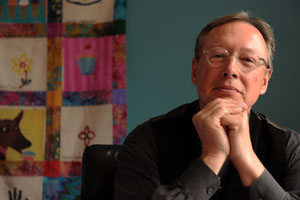Aid for Africa
Tom Derdak funds African businesswomen so they can provide for AIDS orphans.
By Katie Morell
Photography by Dan Dry
In 2002 Sarah Anyango Okumu was a 30-something woman living in the slums of Nairobi, Kenya. The mother of five children, she was trying to get a new tailoring business off the ground while her husband worked intermittent construction jobs. But in 2003 her luck changed, thanks in part to Tom Derdak, PhD’85, founder and executive director of the grassroots nonprofit Global Alliance for Africa, a microlending organization dedicated to helping children orphaned by AIDS.

Derdak and Global Alliance’s first microloan went to a Kenyan woman to start a tailoring business.
“When I met Sarah, she was part of a group of women who came and asked us about the possibility of a loan scheme,” Derdak says. He and Global Alliance already had been doing health-care work in East Africa, “but this was our first foray into lending.”
Now the organization’s primary focus is microlending—making low-interest loans—to women to help them start small businesses. The loans range from $25 to $2,500, with most between $40 and $100. In addition to paying back interest, the women agree to take care of orphans in their community—funding them through high-school age, using the money generated by their businesses to provide the children with food, shelter, and education.
Years before meeting Anyango Okumu, after leaving Chicago with a philosophy degree, Derdak worked in publishing and then in the nonprofit world. In 1995 he encountered Job Bwayo—then a leading HIV researcher in Nairobi, Kenya—who opened his eyes to Africa’s health-care problems.
With the advice and encouragement of Bwayo, who died in a 2007 carjacking in Nairobi, Derdak formed Global Alliance for Africa. He started the Chicago-based foundation in 1996, out-of-pocket. It began with a health-care mission, providing safe water for poor children, as well as nutrition and psychosocial help.
After about three years, the organization’s focus shifted: “People from the community would come up to us and say we needed to do something about the growing issue of orphans” affected by HIV/AIDS, Derdak says. “Sarah was one of those people.” It was in the late 1990s, before global health groups were fully aware of the AIDS epidemic’s scale in Africa. Global Alliance decided to change its focus, “to keep a component of health care but also provide services to orphans.”
In 2003 the organization lent Anyango Okumu $40 for her tailoring business. In turn she took in three orphans, providing for them with profits from her business. “When she started the program,” he says, “her whole family, including the three orphans, lived in the slums in an eight-foot-by-ten-foot room.”
She repaid the loan with interest and subsequently received and paid back two more loans. “In 2009 she moved her family out of the slums and bought a house. I see her almost every time I go to Africa,” says Derdak. “She is now training other people to do tailoring.”
He believes that microlending, which has become popular in the developing world over the past decade, is a way for money to go to the sustained betterment of those nations. “A loan is not considered a handout; it is a way of investing in a woman’s future,” he says. “The burden of responsibility is on the woman and her ability to create a sustainable financial future on her own and not on the development organization.”
Anyango Okumu’s success story is one of many, says Derdak. “Since 2003 we’ve given out 20,000 loans and reached 17,000 people, all of whom have been directly affected by AIDS.” Offering business loans to cooperatives of women in Kenya, Tanzania, and Uganda, the program also partners with grassroots groups to offer social-work counseling, access to health care, and, in Tanzania, legal representation.
Loans are tracked closely; Derdak visits Africa about four times per year, where 20 of the program’s 24 staffers work full time. The organization records everything from “the giving of the loan”—there is a 95–96 percent repayment rate—“to how it is used to start a business to how the profit from the business helps orphans,” says Derdak. “We visit households on a regular basis to make sure there is food on the table and the children have shelter.”
Derdak also has a greater goal for the country’s overall economic health. At the moment, he says, most women providing services like haircuts or tailoring receive money in cash for their work and don’t pay taxes. Once they become business owners, “they can start paying taxes, and that will help the tax base expand. Then countries will be able to afford social services. We are in it for the long-term.”
Large-scale changes, he says, can be made through small amounts of money. “You can really help people move from living a subsistence life to a middle-class existence in these developing countries.”
WRITE THE EDITOR
E-MAIL THIS ARTICLE
SHARE THIS ARTICLE
RELATED READING
“Global Activism: Local Organization Helps AIDS Orphans in Africa” (Chicago Public Radio, Worldview, November 6, 2008)
